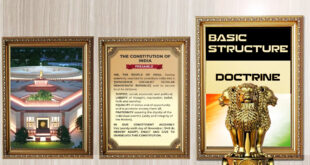The challenges made to the 103rd constitutional amendment present a more difficult judicial examination than usual
Constitutional challenges are often described as hard cases. This is, however, seldom true. Invariably, disputes possess a simple solution. We can debate over what theories of interpretation to apply and over whether the text of a clause needs to be read literally or in light of its historical background, but in most cases, the Supreme Court’s own precedent and commonly accepted legal theories provide an easy enough guide to finding a principled answer. The challenges made to the 103rd constitutional amendment, though, which a two-judge bench of the Supreme Court is slated to hear this month, present a rather more difficult test. The law, which was introduced in January this year, amends Articles 15 and 16 of the Constitution, and grants to government the power to provide for reservation in appointments to posts under the state and in admissions to educational institutions to “economically weaker sections of citizens [EWS]”. At first blush, this reservation, which can extend up to 10% of the total seats available, may not appear to impinge on the existing constitutional arrangement. But what it does mandate is a quota that will apply only to citizens other than the classes that are already eligible for reservation. Consequently, persons belonging to Scheduled Castes and Scheduled Tribes and persons who are not part of the creamy layer of the Other Backward Classes will not be eligible to the seats available under the quota.
Meaning and purpose
In some senses, as sociologist Gail Omvedt wrote in these pages (“The purpose of reservation – I”, March 24, 2000), “the whole history of the struggle for reservation has also been a debate about its very meaning and purpose”. When reservations were first introduced by some of the princely states the policy was seen largely as an alleviative measure. For instance, in the princely State of Mysore, where privileged castes had cornered virtually every post available under the government, a system of reservations was introduced denominating communities as “Backward Classes”, and providing for them a larger share in the administration. By the time the Constitution was being drafted as a reading of the Constituent Assembly’s debates shows us, the rationale for reservations had broadened. The Constitution’s framers saw the measure as a promise against prejudice, as a tool to assimilate deprived groups into public life, and as a means of reparation, to compensate persons belonging to those groups for the reprehensible acts of discrimination wrought on them through history. Marc Galanter has called this a compensatory discrimination principle. Indeed, the policy and the idea of justice that undergirds it have been seen as so indispensable to the Constitution’s aims and purposes that the Supreme Court in State of Kerala v. N.M. Thomas (1975) held that reservations based on social and educational backwardness, far from being an exception ought to be seen as an intrinsic facet of the idea of equality.
Unseating equality
It is in departing from this logic that the 103rd amendment unseats the Constitution’s code of equality. Pure financial ability is a transient criterion; it doesn’t place people into a definite group requiring special privileges. If anything, allowing for reservation on such a principle only further fortifies the ability of powerful castes to retain their positions of authority, by creating an even greater monopolisation of their share in administration. If such an end is indeed the vision, it’s difficult to see how the elementary conception of equality guaranteed by the Constitution can continue to survive. Now, no doubt the Supreme Court may, on the face of things, consider Parliament as possessing the power to altogether dismantle the Constitution’s existing idea of equality without simultaneously demolishing the document’s basic structure. But, if nothing else, when the court hears the challenges made to the 103rd amendment, it must see the petitioners’ arguments as representing a credibly defensible view. The least the court ought to do, therefore, is to refer the case to a constitution bench, given that Article 145(3) mandates such an enquiry on any issue involving a substantial question of law concerning the Constitution’s interpretation, and, in the meantime, stay the operation of the amendment until such a bench hears the case fully. Should the court fail to do so the government will surely one day present to it a cruel fait accompli.
Source : https://www.thehindu.com/todays-paper/tp-opinion/a-test-of-law-and-justice/article28460455.ece
 Chinmaya IAS Academy – Current Affairs Chinmaya IAS Academy – Current Affairs
Chinmaya IAS Academy – Current Affairs Chinmaya IAS Academy – Current Affairs



